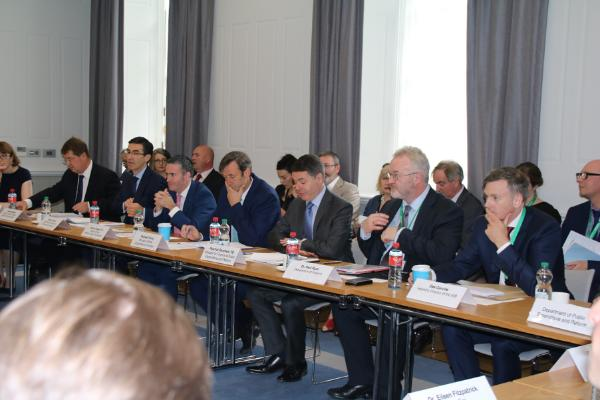
- EUR 330 million EIB financing signed to date in 2018 and EUR 1.8 billion of new Irish projects approved
- EIB on track to deliver support for over EUR 1 billion in new Irish investment in 2018
- EIB – Ireland Financing Group confirms new initiatives to support businesses impacted by Brexit confirmed and EIB technical and financial experience to back social housing, renewables and energy efficiency investment in Ireland
The European Investment Bank, the world’s largest international public bank, will strengthen support for priority investment in Ireland in the coming months. Details were confirmed during a visit to Dublin by EIB Vice Presidents Andrew McDowell and Jonathan Taylor who discussed the impact of recent financing and future strategic investment in Ireland with Irish ministers.
New initiatives to enhance access to finance by companies most vulnerable to Brexit, improve financing for affordable housing and stimulate future climate action investment in renewable energy and energy efficiency in public and private buildings were agreed by the EIB-Ireland Financing Group meeting at the Department of Finance in Dublin earlier today.
“The EIB has a unique track record supporting crucial investment across Ireland. Today’s discussions between Ministerial colleagues and the EIB will ensure that Ireland benefits even more from the EIB’s unique technical experience and financial strength in the months and years ahead. New initiatives to assist companies most exposed to Brexit uncertainty, harness renewable energy resources, such as offshore wind, cut energy bills in public buildings and private homes and increase equity financing demonstrate the close partnership between Ireland and the EIB.” said Paschal Donohoe, Finance Minister and EIB Governor.
“Strengthened cooperation between the EIB and Irish partners has enabled EUR 330 million of new financing for crucial new investment across the country to be agreed already this year. This has supported higher education at Grangegorman, renewable energy in Mayo, private sector innovation in Galway and the largest ever ferry on the Irish Sea. New financing totalling EUR 1.8 billion has been approved and backing for broadband, social housing, energy and airport investment being concluded. Today’s detailed discussions will ensure that the EIB’s unique understanding of sector challenges and market gaps can benefit future investment to tackle climate change, increase affordable housing and help Irish companies most at risk from Brexit.” said Andrew McDowell, European Investment Bank Vice President responsible for lending operations in Ireland.
Minister Donohoe chaired discussions between government ministers responsible for finance, business, agriculture, housing and climate action, Irish financial institutions and senior bank representatives at the Department of Finance. Ministers from the Department of Business, Enterprise and Innovation, the Department of Agriculture, Food and the Marine, Department of Housing, Planning and Local Government confirmed key investment priorities and highlighted new initiatives. The EIB-Ireland Financing Group was established in 2016 and meets twice a year.
EUR 1 billion new financing in Ireland expected in 2018
Ministers also took note of planned operations by the EIB Group for the remainder of 2018 that are likely to match or surpass the EUR 1 billion of new investment in 2017.
New financing already signed in 2018 includes support for a new ship for Irish Ferries, the Owenniny windfarm, third-level education at Grangegorman, sustainably forestry and innovation investment by Irish corporates.
The EIB further confirmed that financing for new projects including social housing, broadband and mobile networks, airport investment and support for mid-cap firms totalling EUR 1.8 billion have been approved by the EIB board with loans currently being concluded.
Strengthened EIB support for companies impacted by Brexit
A new initiative developed by the Department of Business, Enterprise and Innovation, Department of Agriculture, SBCI and the EIB to support long-term investment by companies and agricultural firms most vulnerable from the withdrawal of the United Kingdom from the European Union is expected to be finalised in the coming months. This will be supported by the European Investment Bank, European Investment Fund and Irish financial partners.
This follows the successful launch in March of a EUR 300 million working capital support scheme with SBCI, guaranteed by the EIB Group, and managed by AIB, Bank of Ireland and Ulster Bank.
Expanding affordable housing across Ireland
The EIB-Ireland Financing Group confirmed that a pilot initiative to increase the availability of affordable housing would be launched in the near future. Given the importance of enhancing the supply of affordable housing in Ireland, experts from the Department of Housing, Planning and Local Government and EIB have been examining ways to increase the supply of housing accessible to group’s such as those working in essential public services. A pilot programme to use land owned by local authorities for new housing development is currently being developed.
Unlocking new renewable energy and energy efficiency investment
New initiatives to help Ireland meet its climate action goals by harnessing renewable energy, such as offshore wind, and cutting energy bills in private housing and public buildings were agreed by the EIB-Ireland Financing Group. Technical support programmes to enable development of offshore wind projects in Irish waters and to scale up energy efficiency investment in both public buildings and by households, such as through new lending programmes in partnership with Irish banks, will be the focus of common efforts in the coming months and are expected to play an important role in helping deliver on Ireland’s climate and energy targets.
The EIB is the world’s largest financier of renewable energy and last year provided more than EUR 5 billion to support energy efficiency investment.
In 2017 the European Investment Bank provided more than EUR 1 billion of new financing for public and private investment across Ireland. This includes support for new long-term investment to transform healthcare, education and transport infrastructure as well as business investment across the country.

